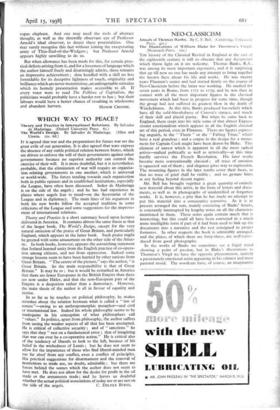WHICH WAY TO PEACE ?
Theory and Practice in International Relations. By Salvador de Madariaga. (Oxford University Press. 6s.) IT is agreed that war and the preparations for future war are the great evils of our generation. It is also agreed that wars express the absence of any stable political relation between States, which are driven to enforce the will of their governments against other governments because no superior authority can control the exercise of their will. It is more doubtful, but it is nevertheless probable, that the elimination of war will require an organisa- tion relating governments to one another, which is universal or world-wide. The forces tending towards such organisation both in public opinion and in established institutions, especially the League, have often been discussed. Senor de Madariaga is on the side of the angels ; and he has had experience in places where angels fear to tread—on the Secretariat of the League and in diplomacy. The main lines of his argument in both his new books follow the accepted tradition in some criticisms of the League and some suggestions for the improve- ment of international relations.
Theory and Practice is a short summary based upon lectures delivered in America. It contains almost the same thesis as that of the larger book, The World's Design, except for the very natural omission of the praise of Great Britain, and particularly England, which appears in the latter book. Such praise might be greeted with some amusement on the other side of the Atlan- tic. In both books, however, appears the astonishing statement that Ireland learned unity from the English practice of co-opera- tion among citizens, and not from oppression. Indeed some strange lessons seem to have been learned by other nations from Great Britain. " The centre of the picture," says the author, " is Great Britain. So the main responsibility is that of Great Britain." It may be so ; but it would be remarked in America that there are fewer Europeans in the British Empire than there are now under Hitler, and that the non-European part of the Empire is a despotism rather than a democracy. However, the main thesis of the author is all in favour of equality and justice.
In so far as he touches on political philosophy, he makes mistakes about the relation between what is called a " law of nature "—owing to an anthropomorphic metaphor—and civil or international law. Indeed his whole philosophy seems to be inadequate in his conception of what philosophers call " values." In politics, apart from philosophy, the author suffers from seeing the weaker aspects of all that has been attempted. He is critical of collective security ; and of " sanctions " he
says that they " rest on a fundamental error ; that of imagining that war can ever be a co-operative action." He is critical also of the tendency of liberals to look to the left, because of his belief in the wickedness of Lenin ; but he does not seem to allow for the impatience of those who find liberal-minded men too far , aloof from any conflict, even a conflict of principles.
His practical suggestions for disarmament and the removal of restrictions to trade are, no doubt, admirable ; but there are forces behind the scenes which the author does not seem to have met. He does not allow for the desire for profit in the oil trade or the armaments trade; and he leaves us doubtful whether the actual political associations of today are or are not on






































 Previous page
Previous page